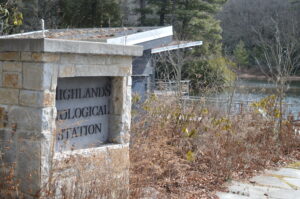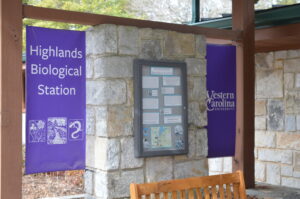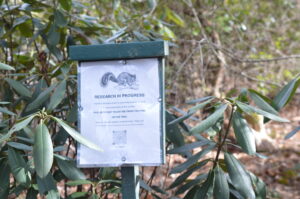Just 32 miles south of Western Carolina University and only minutes from downtown Highlands sits a unique and integral biological hotspot.
The Highlands Biological Station (HBS) was founded in 1927 and has grown its educational and research missions for nearly a century. In 2018, HBS became a multi-campus center of Western Carolina University.
HBS is situated in an area renowned for its biological diversity. Salamanders, mammals, freshwater fish, flowering plant species and much more thrive in the mild temperatures, ample rainfall and rugged terrain of Highlands.

“It also doesn’t hurt that much of the land is conserved as part of the Nantahala National Forest,” Associate Director of the station, Jason Love said.
“The North Carolina Wildlife Resources Commission, state parks, Great Smoky Mountains National Park, and local land trust also protect wide swaths of land where natural processes can occur with minimal interference by humans.”
As associate director of the station, Love spends much of his time overseeing research and supervising research assistants.
Growing up, Love spent summers in the north Georgia mountains fishing, hunting and exploring. He would go on to work in various

research and education positions throughout the Great Smoky Mountains. Love has been at HBS since 2019.
“So much of my life has been folded into the coves and valleys of these wonderful mountains,” Love said.
It is personal connection like this and the site’s unique propensity for research that make it a special part of Western’s multi-campus center.
Ella Harmon is a recent WCU alumni. Harmon graduated in 2023 with a Bachelor of Science in biology. She spent two weeks at the biological station during the summer 2022 semester for the Comparative Temperate and Tropical Ecology and Biogeography class.
The biological station acted as a basecamp for the class as they took various trips throughout the southern Appalachians to conduct research and identify different ecological factors unique to the area.
The second component of the class was a three-week trip to Ecuador. Students spent time in the lower Amazon basin collecting data and doing research at a facility there. The facility is a sister station to the Highlands Biological Station.
“The station also serves as an educational beacon for students interested in taking a deep dive into an ‘-ology,’ – ornithology, ichthyology, botany, aquatic entomology – all which are focused on studying those organisms found in the southern Appalachian Mountains,” Love said.
Harmon is pursuing a career in wildlife biology, and she feels like her experience at HBS has prepared her for that.

“It’s such a great opportunity to get to go there. You’re immersed in so much wildlife,” Harmon said.
Highlands provides a perfect opportunity for students to experience healthy ecosystems and incredible biodiversity within an hour from campus.
Students have a variety of opportunities to get involved at HBS.
“We’re always looking for volunteers to help in the many aspects of the station, from our botanical garden volunteer days to assisting with the many research projects,” Love said.
For a full catalog of classes being taught at HBS this summer, visit https://highlandsbiological.org/summer-2024-academic-courses






